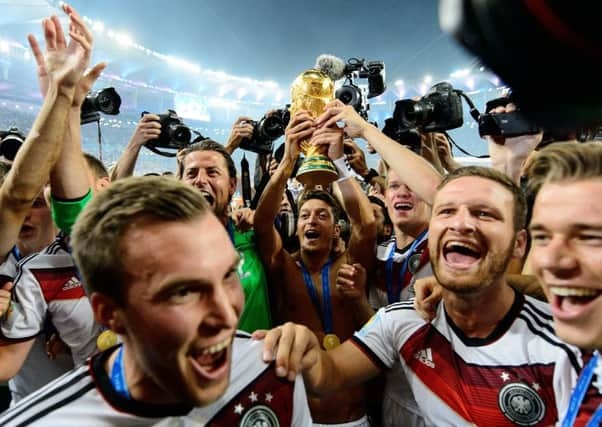Fab four ready to rock at the World Cup in Russia


A bells and whistles football extravaganza certainly shouldn’t be allowed to drown out the voices calling Russia to account. It shouldn’t, but... however shameful the admission may be, the childlike excitement a World Cup induces in lovers of the game means the football always wins through. Against any backdrop, it seizes the focus and simply won’t let it go. In terms of what that could inspire over the next month, there’s the chance of thrills a-gogo.
There is an oddity to a 32-team World Cup bereft of Italy and the Netherlands – three-time winners and three-time finalists, respectively. Those teams apart, though, the delicious element to the latest edition of the supreme sporting occasion is that so many of the heavyweights appear at their absolute fighting fittest. Holders Germany, Brazil, Spain and France – winners of six of the past seven tournaments – all come into that bracket. Argentina are the exception with structural shortcomings under head-scratching coach Jorge Sampaoli but any team spearheaded by Lionel Messi – on perhaps his final mission to emulate the great Diego Maradona – and Sergio Aguero can hardly be considered without potency.
Advertisement
Hide AdAdvertisement
Hide AdWhat the leading quartet possess, though, is a balance between finesse and fluency. Germany have an outstanding opportunity to become the first team since Brazil in 1962 to achieve back-to-back successes because Joachim Low has assembled a squad that can demolish opponents with explosive attacking transitions. As with Spain, revitalised under coach Julen Lopetegui, Brazil and France, they teem with talent. The German breakthrough youngsters include striker Timo Werner and right-back Joshua Kimmich, successor to Philipp Lahm. They augment a formidable defensive triangle of keeper Manuel Neuer – fitness permitting – Mats Hummels and Jerome Boateng, as well as accomplished performers such as Thomas Muller, Julian Draxler and Toni Kroos. To name but a few.
The Spanish retain a clutch of the mainstays that allowed them to make history by sandwiching a World Cup triumph between European Championship success in an all-conquering four-year spell. So Russia provides a last hurrah for the outrageously decorated Andres Iniesta, Sergio Ramos, David Silva, Gerard Pique and Sergio Busquets. But with such as Isco and Koke coming to the fore, they have new blood to provide a fresh dimension.
Goals flow from Germany and Spain, as they do from a Brazil reconfigured and recalibrated under coach Tite to ensure they do not become a sideshow of a team to Neymar’s brilliance. The Paris Saint-Germain forward, along with all-time greats Cristiano Ronaldo and Messi, will consume the commentariat, and the recent triumph of individualism at the apex of the sport provides part of the fascination for what ensues in Russia.
The goalfests that the Champions League served up in the past year demonstrated that elite performers of this era seek to express themselves often unencumbered by thoughts of stopping their opponents doing likewise. That’s fine if you have quality personnel that belong to football’s ‘haves’. France have as many of these as any other team in the competition, with such as the predatory Antoine Griezmann, the electric Kylian Mbappe and Paul Pogba, ensuring they have many backers to claim a second World Cup win.
Yet, even the middle-ranking sides have the personnel to put themselves in contention. Belgium’s Eden Hazard is a potential golden boot winner; England expect from captain and goal sniffer Harry Kane; the club list from which Croatia’s squad is drawn is a who’s who of world football; and with Luis Suarez and Edinson Cavani leading the line, Uruguay are a frightening proposition in attack.
All too scary for the footballing ‘have nots’ that will populate the finals. That creates a tension as to what sort of spectacles are served up and how these finals will be remembered. Against the star-stuffed attacking nations will be ranged countries whose limitations will see them place organisation and awkwardness ahead of other considerations; including enterprise or entertainment. Not many are drooling about the prospect of watching ultra-defensive Saudi Arabia, Panama, Japan, the cautious Sweden, Iceland, Costa Rica, Nigeria and the injury-hirpled host Russia and similarly afflicted Tunisia.
It is often said that a good World Cup requires the host nation to make an impression in order to whip up national fervour. Considering Russia had to bring 38-year-old centre-back Sergei Ignashevich out of international retirement, it isn’t even a given they will escape from a group that also includes Uruguay, Mo Salah’s Egypt and Saudi Arabia. The worth of Russians on the field is at least something that will come out in the wash.